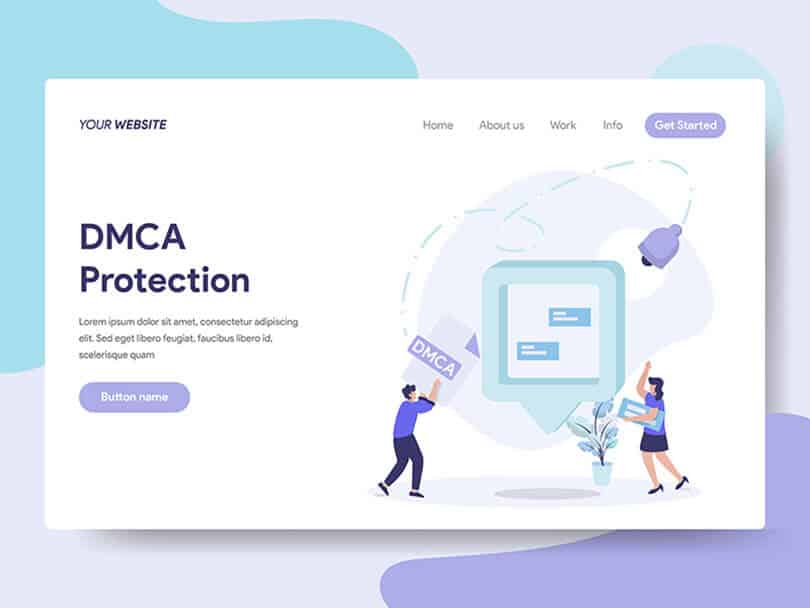DMCA Penalty Update: Taking Down Copyright Infringers
-

Aaron Gray
-
 April 27 , 2023
April 27 , 2023 -
 4 min read
4 min read

The Digital Millennium Copyright Act, more commonly known as DMCA, is a law that protects people from copyright infringement of their original works like art, music, and literature, among others. Moreover, the criminalization of plagiarizing content has been heightened for Internet users. A DMCA takedown notice informs a site operator, web host, or search engine that the material they’re hosting or linking to are published without the source’s consent.
What’s It For
Google announced that the algorithmic update, also known as Pirate, stemmed from having received tons of copyright removal notices; up to 4.3 million links in just one month. That’s why the team decided to use this factor as a signal to determine which websites should rank high in the SERPs and which ones should be devalued or delisted.
The developers clarified that the new signal would merely influence a page’s rank, but it doesn’t necessarily mean that it would be removed from the SERPs altogether. Google can only do that when the rights owner sends them a valid DMCA takedown notice. Plus, to prevent the abuse or misuse of this system, the search engine also supplied site operators with counter-notice tools if they think that their content was wrongly removed.
Meanwhile, Google continues its monthly search quality updates for June and July 2012. Collectively, the two months witnessed 86 changes to the algorithm. Notable changes involved improvements in the search engine’s dictionary, caching processes, top results ordering, results relevance, image search signals, and understanding of long-tail queries, among many others. It also included a data refresh for the Panda algorithm.
What Were Its Effects
The DMCA penalty update has reinforced Google’s advocacy to provide users with relevant search results that offer them original content. The underlying premise to rank high in the search engine’s SERPs is to give readers valuable information, useful insights, and fresh perspectives. While there are still some sites that plagiarize content today, this algorithmic change laid down the foundation for encouraging everyone online to respect each other’s creative works.
Google has always been transparent about the amount of copyright removal notices they handle. The team gives out reports that include the number of URL elimination requests and breaks it down to how many specified domains, copyright owners, and reporting organizations are involved.
What It Means for You
Your domain and everything in it is your digital assets. In the same way that you protect your physical products from theft, you should also guard your intellectual property to make sure that no one misuses it for their unfair advantage. Conversely, you should also respect other people’s works and refrain from using them without their consent.
Copyright defends creators or authors of dramatic, artistic, literary, and musical works. Here’s a look at each one:
- Dramatic – This includes plays, movies, scripts, and any accompanying music that’s used within it.
- Artistic – Artistic works pertain to the arts like photos, sculpture, collages, paintings, illustrations, maps, and diagrams, among others.
- Literary – It involved literature such as fiction, non-fiction, catalogs, directories, poetry, and even computer programs as well as databases.
- Musical – Songs, musical scores, and accompanying lyrics fall into this category.
Take note that facts, ideas, names, systems, and operations aren’t covered by copyright, only the method by which they are expressed. Moreover, it’s not necessary for you to register your content for this type of protection although having the certification will definitely provide weightier evidence against violators.
On the other hand, this system can still be abused and misused by your more cunning competitors to underhandedly keep you out of business through bogus DMCA takedown notices. If you feel that you’ve been wrongfully accused, you can send a counter-notification to inform Google that you did not plagiarize content and they should restore your removed page.
The search engine will then advise the complainant about the mistake. Unless they file a lawsuit against you, Google will automatically display your content again in the SERPs. If you don’t see the page being restored, it’s highly likely that the pursuer is preparing to go to court for the alleged copyright infringement.
These are the information you should include in your put-back notice:
- Denial of Allegations – In a respectful way, refute the accusations that you plagiarized content and include evidence that you are the source.
- Full Name –
- Address – This pertains to the address associated with your business.
- Consent to Jurisdiction – It’s a legal clause that you confirm to resolving the issue regardless of the location especially with the Internet being global.
- Oath of Authenticity – This one is a promise that your counter-notification was done in good faith.

